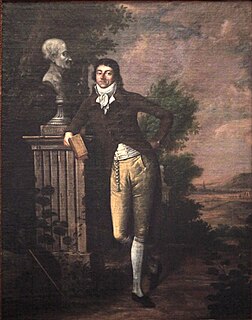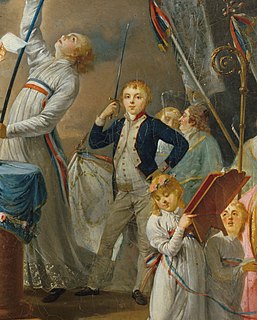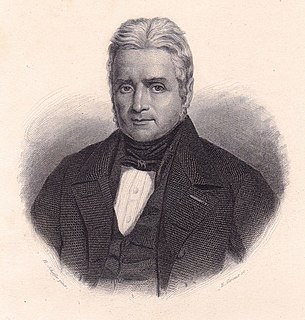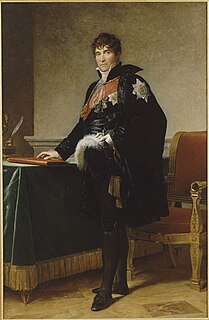 W
WBertrand Barère de Vieuzac was a French politician, freemason, journalist, and one of the most prominent members of the National Convention, representing the Plain during the French Revolution. The Plain was dominated by the radical Montagnards and Barère as one of their leaders supported the foundation of the Committee of Public Safety in April and of a sans-culottes army in September 1793. According to Francois Buzot, Barère was responsible for the Reign of Terror, like Robespierre and Louis de Saint-Just. In Spring 1794 and after the Festival of the Supreme Being, he became an opponent of Maximilien Robespierre and joined the coup, leading to his downfall.
 W
WNicolas Léonard Beker or Nicolas Léonard Becker or Nicolas Léonard Bagert, born 18 January 1770 – died 18 November 1840, joined the French army as a dragoon before the French Revolutionary Wars and rose in rank to become a general officer. In 1800 he married the sister of Louis Desaix, who was killed at the Battle of Marengo. He led an infantry brigade in the 1805 campaign and commanded a dragoon division in 1806 and 1807. In 1809 he became chief of staff to Marshal André Masséna but ran afoul of Emperor Napoleon and was banished from the army for several years.
 W
WLouis Pierre Édouard, Baron Bignon was a French diplomat and historian.
 W
WLazare Nicolas Marguerite, Count Carnot(13 May 1753 – 2 August 1823) was a French mathematician, physicist and politician. He was known as the "Organizer of Victory" in the French Revolutionary Wars and Napoleonic Wars.
 W
WJacques Defermon des Chapelieres was a French statesman during the French Revolution and a supporter of Napoleon Bonaparte and the French Empire.
 W
WJean-Baptiste Drouet was a French politician of the Revolution and the Empire, best known for his key role in the arrest of King Louis XVI and his family during the Flight to Varennes.
 W
WAndré Marie Jean Jacques Dupin, commonly called Dupin the Elder, was a French advocate, president of the chamber of deputies and of the Legislative Assembly.
 W
WJacques-Charles Dupont de l'Eure was a French lawyer and statesman.
 W
WJoseph Fouché, 1st Duc d'Otrante, 1st Comte Fouché was a French statesman, revolutionary, and Minister of Police under First Consul Napoleon Bonaparte, who later became Emperor Napoleon. He was particularly known for the ferocity with which he suppressed the Lyon insurrection during the Revolution in 1793 and for being minister of police under the Directory, the Consulate, and the Empire. In English texts, his title is often translated as Duke of Otranto.
 W
WDominique Joseph Garat was a French Basque writer and in 1792 minister of Justice and in 1793 minister of Interior.
 W
WLouis Gaspard Amédée, baron Girod de l'Ain was a French lawyer and politician who became Minister of Public Education and Religious Affairs in 1832.
 W
WAntoine Jay was a French writer, journalist, historian and politician.
 W
WGeorges Washington Louis Gilbert de La Fayette was the son of Gilbert du Motier, Marquis de Lafayette, the French officer and hero of the American Revolution, and Adrienne de La Fayette. He was named in honor of George Washington, under whom his father served in the Revolutionary War.
 W
WMarie-Joseph Paul Yves Roch Gilbert du Motier, Marquis de La Fayette, known in the United States as Lafayette, was a French aristocrat and military officer who fought in the American Revolutionary War, commanding American troops in several battles, including the siege of Yorktown. After returning to France, he was a key figure in the French Revolution of 1789 and the July Revolution of 1830. He has been considered a national hero in both countries.
 W
WJacques Laffitte was a leading French banker, governor of the Bank of France (1814–1820) and liberal member of the Chamber of Deputies during the Bourbon Restoration and July Monarchy. He was an important figure in the development of new banking techniques during the early stages of industrialization in France. In politics, he played a decisive role during the Revolution of 1830 that brought Louis-Philippe, the duc d'Orléans, to the throne, replacing the unpopular Bourbon king Charles X. Laffitte was named president of the new Citizen King's Council of Ministers and Minister of Finances. After a brief ministry of 131 days, his "Party of Movement" gave way before the "Party of Order" led by the banker Casimir-Pierre Perier. Laffitte left office discredited politically and financially ruined. He rebounded financially in 1836 with his creation of the Caisse Générale du Commerce et de l'Industrie, a forerunner of French investment banks of the second half of the 19th century such as the Crédit Mobilier (1852). The Caisse Générale did not survive the financial crisis caused by the Revolution of 1848.
 W
WJean Denis, comte Lanjuinais, was a French politician, lawyer, jurist, journalist, and historian.
 W
WPhilippe-Antoine Merlin, known as Merlin de Douai was a French politician and lawyer.
 W
WFrançois Just Marie Raynouard was a French dramatist and linguist.
 W
WMichel Louis Etienne Regnaud, later 1st Count Regnaud de Saint-Jean d'Angély was a French politician.
 W
WHorace François Bastien Sébastiani de La Porta was a French general, diplomat, and politician, who served as Naval Minister, Minister of Foreign Affairs, and Minister of State under the July Monarchy.